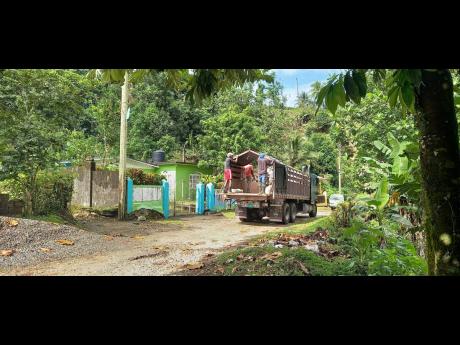Farming woes in Rio Grande Valley go beyond bad roads, says White
Rio Grande Valley, Portland:
The Rio Grande Valley in Portland Eastern still has a network of roads in deplorable condition, 12 years after a market truck crash which claimed the lives of 14 people, including a 10-year-old boy.
Today marks the 12th anniversary since the truck, laden with agricultural produce and which was transporting 21 people – the majority of whom were higglers from the communities of Ginger House, Comfort Castle, Mill Bank and Cornwall Barracks – plunged into a ravine at Dam Bridge at about 9 p.m. as they were making their way to the Coronation Market in Kingston.
Since the tragedy, the roadway leading from Cross Roads in Port Antonio to Moore Town has been resurfaced, but the above-named communities are still bedevilled by bad roads. So, too, are those of Bellevue and a section of Kent, where roughly two miles of resurfacing work was done.
Mill Bank resident and former Mayor of Port Antonio Benny White pointed out that rehabilitation work had been carried out on the road in the wake of the accident, and that roads in other communities have been repaired in recent times.
Sustainable development
He acknowledged that a lot more could have been done by successive governments to improve the road surfaces, but said that bad roads were not the main thing holding back residents of the communities in the area.
“What is happening in the Rio Grande Valley is really more than a road problem,” White told The Gleaner.
“Yes, the previous [People’s National Party] administration did some work, and also, recently, the now [Jamaica Labour Party] administration did resurfacing work from the Alligator Church Bridge to Kent, which is approximately two miles of roadway. But if the entire Rio Grande Valley is carpeted, it wouldn’t solve the problem in the Rio Grande, which comprises farming communities,” he said. “There has to be some sustainable development as it relates to farming.”
White said that repairing all these roads would not be economically viable, and that the focus should instead be placed on rendering assistance to the farmers in terms of greenhouses and other modern ways of farming, to help them increase yields and earning power.
He noted that many farmers in the area have traditionally been engaged in subsistence farming, just producing food for their families.
“The Rio Grande Valley is the breadbasket of the constituency of East Portland, and there was a time when ginger was a prime crop, which was exported in large volumes and was also sold locally. Likewise, dasheen was a crop that was also on the export market, but was seriously affected by a disease. Then we cannot forget the banana, which was basically wiped out by hurricanes,” said White, noting the decline in the production of some crops in the area.
Added the former mayor: “So, while fixing the roads is really a good thing, it is not economically viable and, unless we get intervention and assistance from the Ministry of Agriculture, farmers and families will continue to suffer.”
As The Gleaner visited the Rio Grande Valley on Wednesday, a market truck was seen picking up produce throughout the communities of Mill Bank, Comfort Castle, and Ginger House, to eventually make its way into Kingston.
At least twice per week, two trucks laden with produce such as bananas, dasheen, yams, pumpkins and plantains head out from the area into Kingston, with farmers and higglers on board with high hopes of selling the produce for a profit, as the breadwinners for their families.


